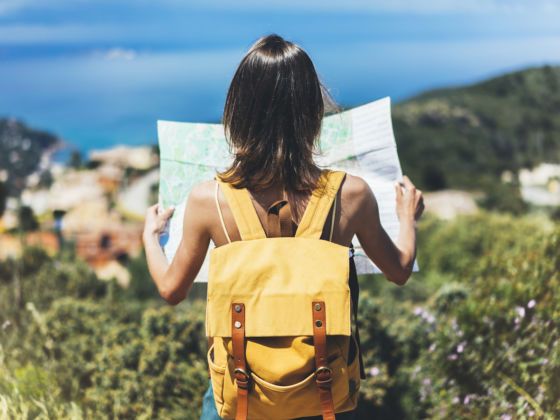I bought the train ticket to Caen on impulse. I knew exactly one fact about the coastal French town: It’s located just a few miles from the Normandy landing beach where American troops launched their offensive against German forces in Nazi-occupied France. Intrigued by this bit of history, my research ended there. When I boarded the train bound for Caen from Paris in the summer of 2013, I didn’t have a hotel room booked or a map saved to my iPhone (this was before Google Maps was ubiquitous). I didn’t know the name of a single restaurant. My overnight stay in Caen, as you can probably imagine, was a total disaster.


The Most Important Thing Solo Travel Taught Me Is Self-Reliance
I had been in France all of four days when I decided to take my little detour, and I spent most of that time paralyzed by anxiety and hunger. Afraid of being laughed at by waiters because I didn’t speak a word of French, I had to gather my courage on the street before stepping into a restaurant. Crushed by jet lag, I roused myself in the late afternoon and then spent the rest of the day trying to hit all the tourist spots before closing time. I was, in other words, totally unprepared for what traveling alone would mean: There was no one to wake me up, tell me to get moving, or back me up when I felt nervous asking a stranger for directions (or to see the lunch menu).
So the trip to Caen was, thinking back on it, probably an opportunity to prove to myself that I could do it. That I could emerge, on my own, in this totally unfamiliar place, unscathed. But the second I got off the train at Gare de Caen, I knew I made a mistake. As the panic set in (I had absolutely no idea where I was!), I followed the crowds to the center of town and walked into hotel after hotel looking for a room. Everything was booked. I wandered around downtown Caen so distracted by the prospect of sleeping outside for a night that I couldn’t tell you a single feature of the town besides the fact that it’s surrounded by steep hills — a fact I remember solely because I walked up and down most of them looking for an empty hotel.
As daylight began to fade, I realized I was not only temporarily homeless but also lost. I was genuinely scared, probably the most afraid simply standing alone on the sidewalk I have ever been. I considered tracking down a police officer and appealing to him or her for assistance, but I pulled the straps of my backpack onto my shoulders, took a few deep but very unsteady breaths, and kept walking. Eventually, I found a hotel, and so exhausted by the ordeal, I stayed in my room all night watching reruns of Supernatural in French.
Generally, I think it’s a good idea to ask for help if you really need it. And it’s also important to note that I never felt any external threat — except perhaps the next day when I got catcalled outside the train station, but that happens to me in the United States, too. But I was embarrassed for myself, for how badly I had messed up and put myself in potential danger. So I decided that I would have to fix it for myself, and I’m glad that I did. Standing on the sidewalk in Caen, the thought that changed my life forever dawned on me: You are enough. You’re clever enough and tough enough to figure this out. I stopped hearing I can’t, I can’t, I can’t, and a much clearer voice announced, You can.
Getting myself to safety made me feel powerful. I was 23 at the time, in graduate school in New York City, and yet very much sheltered and looked after. My dad paid my rent. In college, I worked at American Apparel to support myself, but other than that I had never had a full-time job outside of school. But this I had done myself. My day and night in Caen was a gateway to real independence, to the idea that I am capable of taking care of myself, even when it feels inconvenient and difficult. I learned to manage my fear (not to overcome it — fear kept me alert, a yellow light blinking in my head that would turn to red if and when I lost control of the situation). In turn, I earned a new skill: self-reliance.
Later in the month, I would hop on another train, this time to Brussels. I picked a cheap ticket, which meant I had to wait for my connection to Munich overnight. I felt a bit like Sal Paradise in On the Road, drinking endless cups of coffee from a vending machine so I wouldn’t fall asleep until my train arrived in the early hours of the morning, but I was not afraid. Maybe I should have been, but I wasn’t. Because I had become the keeper of secret but powerful knowledge: that I am capable, up to a reasonable limit, of not just existing, but thriving alone.
This is an important lesson for anyone traveling alone to learn, but I think it’s particularly important for young women. We’re constantly barraged with messaging that casts women as naive and weak, incapable of navigating the world without the protection of, usually, a man. Someone to hold our hand and help us step over puddles. There is absolutely nothing wrong with asking for and receiving help — we couldn’t survive in society without support — but it’s necessary for women to learn how to manage unexpected hardships on our own, if only to disprove the insidious lie that once life gets tough, we need to be rescued. We don’t. We can rescue ourselves.